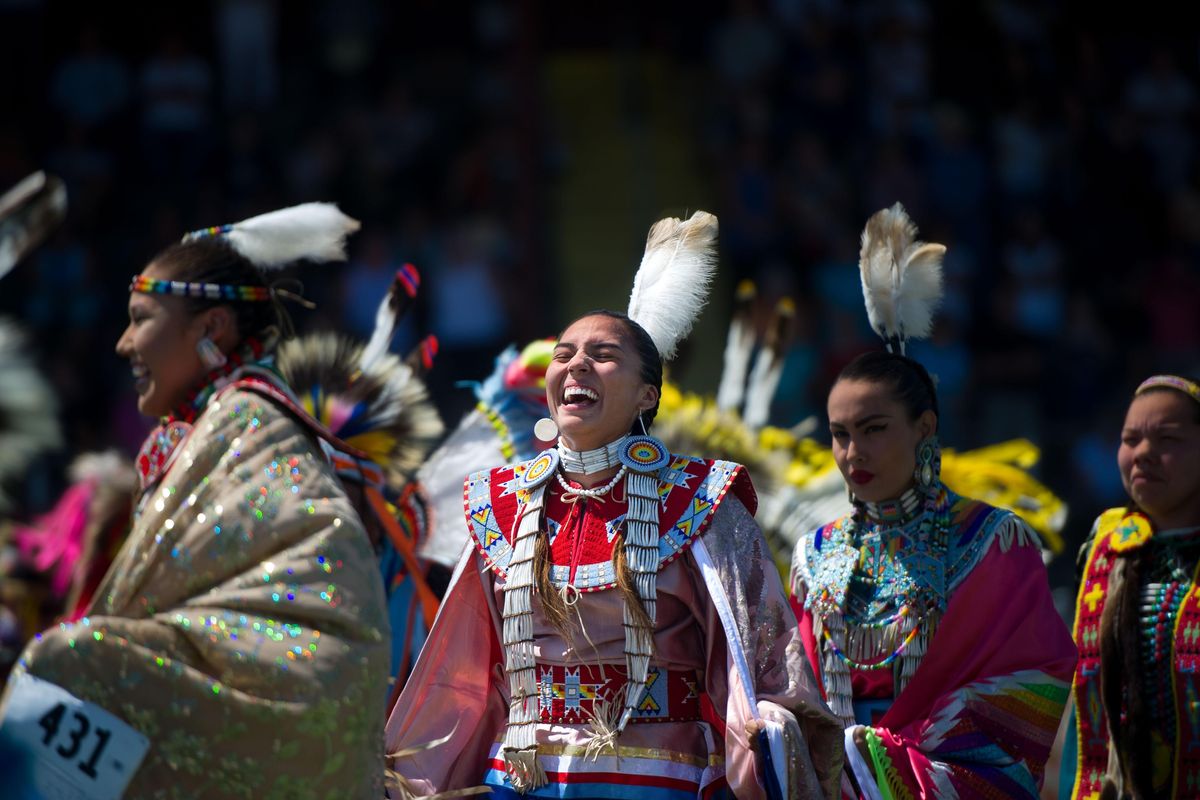For the love of dancing: 20th Julyamsh Powwow kicks off in full color

When a basketball player spends hours perfecting a layup or a baseball player goes through hundreds of balls at the batting cages, the commitment is often summed up with the words, “For the love of the game.”
Julyamsh Powwow board member Bobbie White said she feels the same way.
“For me, it’s the love of dancing,” she said.
A member of the Coeur d’Alene Tribe, White has spent countless hours sewing and beading her family’s regalia. She’s practiced dancing her whole life. Her family goes to a powwow every weekend, and she helped plan this year’s Julyamsh Powwow – the 20th – at the Kootenai County Fairgrounds in Coeur d’Alene on Friday and Saturday.
The powwow, which brings together dancing, singing, arts and crafts, shopping and food, took a year to organize. It kicked off with the grand entry on Friday, where hundreds of people from tribes all over the U.S. and Canada danced and sang as they slowly filed into the arena.
Making regalia beforehand is also a significant part of any powwow, requiring precision and painstaking attention to detail. For White to make her son’s regalia, she said, she had to wake up two hours before her kids to sew and would stay up another two hours after they went to bed.
She attached hundreds, if not thousands, of tiny beads in intricate patterns to the regalia. Each dancer’s outfit has a different design style, whether it be birds, flowers or geometric patterns.
It is incorrect to refer to regalia as a “costume,” Julyamsh Powwow organizers wrote on the event’s website.
“Costumes are reserved for Halloween and such,” it said.
All who participated in the grand entry were dressed in full regalia, their hair in braids. According to the Julyamsh website, the grand entry was originally called a victory dance and could be performed as an announcement of the warriors’ or part of a tribe’s homecoming.
Though White couldn’t take part in the grand entry because she was working, she said dancing is always her favorite part of any powwow. Listening to the drumbeat and song, she said she feels like she can move freely.
“I don’t see or feel or recognize,” she said. “It’s just being invisible when you’re out there dancing.”
Like dancers, drummers also spend a lot of time practicing. Some of their songs are passed down through families and tribes, while some come to them spiritually in the moment, said Laura Stensgar, executive marketing director for the Coeur d’Alene Casino, which hosts the event.
Many of those at the powwow are on a “powwow trail,” spending their entire summer traveling from powwow to powwow, Stensgar said. Quite a few were also weekenders who will stay home during the week and head to a powwow every weekend.
Gary Greene, who is a member of the Nez Perce tribe in Lapwai, Idaho, said he used to be a weekender and has been going to powwows in the region his whole life, as there is a high concentration in the Northwest.
“We live, breathe and eat powwow,” he said.
He likes the family-friendly atmosphere, and he said he feels grounded in his culture when he’s at the events. He said the positive attitudes and sense of community have helped his family stay healthy and happy.
“This is life,” he said. “It’s a good life.”